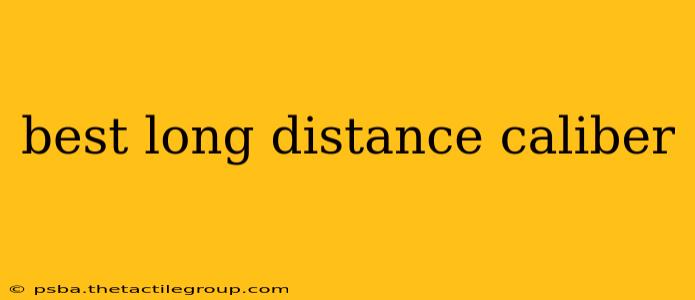Choosing the best long-distance caliber is a deeply personal decision, heavily influenced by intended use, budget, and individual preferences. There's no single "best" caliber, but rather a range of excellent choices, each with its own strengths and weaknesses. This guide explores some top contenders, helping you make an informed choice for your long-range shooting needs.
Factors to Consider When Selecting a Long-Distance Caliber
Before diving into specific calibers, let's examine the key factors that influence the optimal choice:
1. Cartridge Ballistics:
- Muzzle Velocity: Higher velocity generally translates to a flatter trajectory and less wind drift at longer ranges.
- Bullet Weight and BC (Ballistic Coefficient): Heavier bullets with a high BC retain velocity better over distance, reducing drop and wind deflection.
- Energy Retention: Sufficient energy is crucial for effective target impact at extended ranges.
2. Rifle Compatibility:
- Action Type: Bolt-action rifles are generally preferred for long-range shooting due to their accuracy and reliability.
- Barrel Length: Longer barrels generally extract more velocity from the cartridge.
- Twist Rate: The rifling twist rate must be appropriate for the bullet weight and length used.
3. Intended Use:
- Hunting: Ethical hunting at long range necessitates a caliber capable of clean, humane kills.
- Target Shooting: Accuracy and consistency are paramount in competitive target shooting.
- Tactical/Law Enforcement: Specific requirements exist for tactical situations, including penetration and stopping power.
4. Cost:
Ammunition, reloading components, and maintenance costs vary significantly between calibers. Consider the long-term financial implications before committing to a particular caliber.
Top Long-Distance Calibers: A Detailed Comparison
Several calibers consistently excel in long-range applications. Here's a closer look at some prominent contenders:
6.5 Creedmoor:
- Pros: Excellent ballistic coefficient, relatively low recoil, affordable ammunition, readily available in many rifles. A great all-around choice for precision shooting and hunting.
- Cons: Lower energy levels compared to larger calibers at extreme ranges.
6mm Creedmoor:
- Pros: Exceptional ballistic coefficient, even flatter trajectory than the 6.5 Creedmoor, suitable for both hunting and target shooting.
- Cons: May require more precise shooting technique due to its lower sectional density. Ammunition availability might be slightly less than 6.5 Creedmoor.
.308 Winchester (7.62x51mm):
- Pros: Widely available, affordable ammunition, proven performance, relatively low recoil, versatile in hunting and target applications.
- Cons: Less ideal for extreme long-range shooting compared to some of the newer calibers. Trajectory drop is more pronounced.
.300 Winchester Magnum:
- Pros: High energy, good ballistic coefficient, excellent for long-range hunting.
- Cons: Significant recoil, higher ammunition cost, more challenging for less experienced shooters.
6.5 PRC (Precision Rifle Cartridge):
- Pros: Exceptional ballistic coefficient, flatter trajectory than the 6.5 Creedmoor, maintained high energy at long ranges.
- Cons: Relatively newer cartridge, possibly higher ammo cost than more established options.
Choosing the Right Caliber for You
Ultimately, the best long-distance caliber depends on your specific needs and priorities. Consider your budget, intended use, shooting experience, and the ballistic characteristics of each caliber before making a decision. Thorough research and perhaps even some range time with different options will greatly assist in selecting the best caliber to meet your long-range shooting goals. Consulting with experienced long-range shooters and firearm professionals can also be invaluable.

